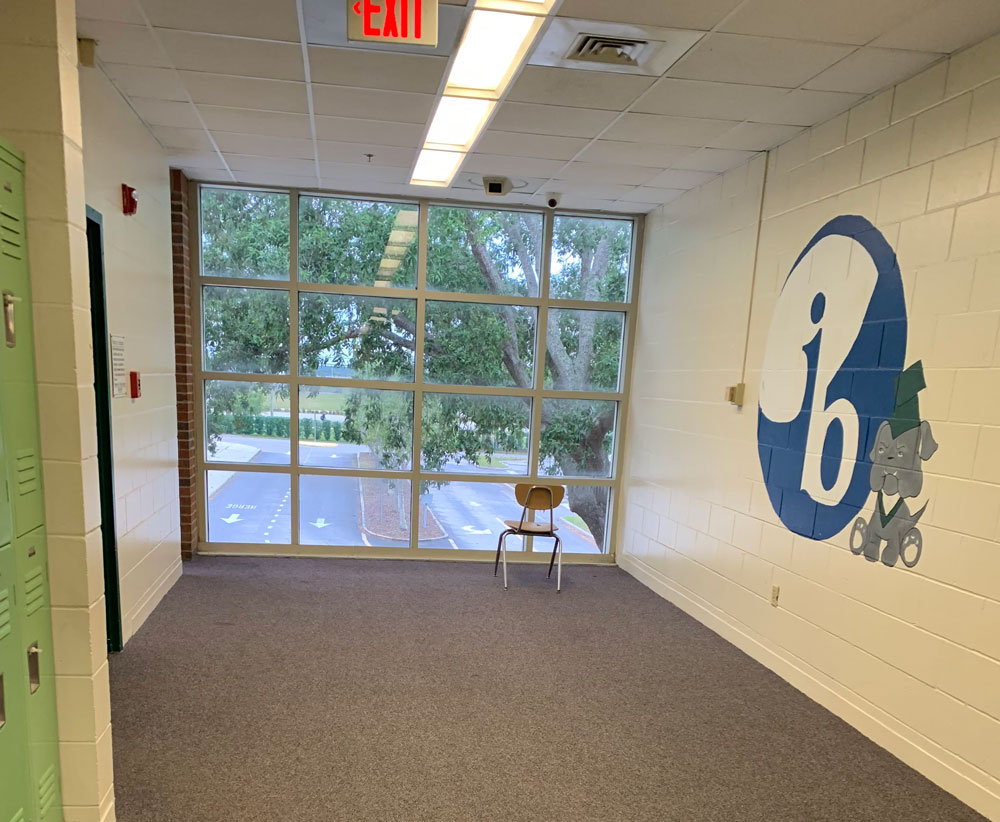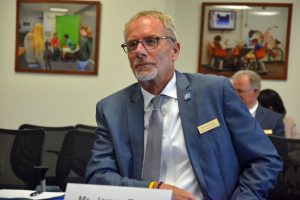
Florida schools will remain closed through the end of the school year, Gov. Ron DeSantis announced Saturday.
DeSantis also announced the state would release the names of long-term care facilities where residents or employees tested positive for the coronavirus reversing course after weeks of refusing to disclose the information.
At a press conference in the Historic Capitol Saturday afternoon, the governor also told reporters that a task force focused on easing the state out of the economic downturn caused by the novel coronavirus will hold its first meeting on Monday.
DeSantis’ decision to keep schools closed comes amid pressure from the statewide teachers’ union and medical groups. The governor acknowledged “there was some division amongst folks” on the issue.
In recent appearances with reporters, DeSantis raised the possibility that some students could return to classrooms sooner than others, receiving pushback from educators and medical groups.
“A lot of our kids haven’t seen friends for a while, so there’s social costs to it (learning from home),” DeSantis, the father of three young children, said Saturday.
But he said it didn’t make sense to bring students, who are now successfully participating in distance learning from home, back to campus for the remaining few weeks of the school year.
“Whether this was a good idea or not, I think the last thing you want to do is force everyone into schools and have half the kids not show up because their parents didn’t want them (to) or teachers didn’t want to do it,” DeSantis said.
“Probably the positive part of this is it gives our employees and our families a sense of knowing what’s going to happen for the rest of the year because if nothing else, Covid-19 has been totally unpredictable,” Flagler County Superintendent Jim Tager said this evening. “It’s been such a time of uncertainty. What we’re doing is not perfect, but we’re situated better than most.” He was referring to Flagler County’s remote-learning system, in place as an extension of the district’s one-to-one initiative, which for several years ensured that every student had a computer or a laptop in hand. Teachers have adapted their curriculum to online education through the devices, while all employees in the district have remained on the payroll, often in alternate roles, in an effort to minimize economic hardships.
This week Flagler’s teachers union joined a statewide call on the governor to keep schools closed for the rest of the school year as a protective measure for older employees. In Flagler, for example, more than two dozen school bus drivers are 65 or older, falling in the age group most vulnerable to complications from the virus. “I kind of question the logistics if we had to go back,” Tager said, though he said he’d have loved to give students the chance to have some form of closure on the year.

(© FlaglerLive)
On Tuesday, the Florida Chapter of the American Academy of Pediatrics, the Florida Chapter of the American College of Physicians, the Florida Osteopathic Medical Association and the Florida Academy of Family Physicians, joined with the Florida PTA in urging DeSantis to keep schools closed.
“(We) feel it is illogical to complete a school year in person that is capable of being completed, as has been proven in the last 30 days, virtually via distance learning,” the letter said. “The risk of encouraging a second yet equally dangerous secondary spread of the virus does not outweigh any potential reward of saving one month of school.”
The Florida Medical Association, the state’s largest physician group, did not sign onto the letter.
“Today’s recommendation to continue distance learning, will give our students, their families, teachers and our school leaders the ability to maximize student learning, while ensuring everyone’s health and safety continues to be our first priority,” Education Commissioner Richard Corcoran said in a prepared statement Saturday evening.
The shutdown of public schools last month came as officials sought to curb the spread of COVID-19, the respiratory disease caused by the highly contagious novel coronavirus. The virus has had a devastating impact on the state’s long-term care facilities.
DeSantis’ announcement Saturday about identifying the infected facilities comes after his administration for weeks refused to reveal the names to The News Service of Florida and other media outlets. The Miami Herald has filed a notice of intent to sue DeSantis to obtain the information.
Noting Saturday that 1,627 long-term care residents and staff have tested positive for COVID-19 so far, the governor said long-term care facilities are supposed to notify other residents, family members and employees if someone at the facility has tested positive.
But he said he did not want to take a chance that the requirement was ignored.
“I don’t want to be in a situation where the families don’t know,” DeSantis said, adding that the disclosure would act as “double security” for getting the information to people who need it.
Several nursing homes and assisted-living facilities already have been identified as hotspots, including facilities in Broward, Suwannee and Pinellas counties.
The Agency for Health Care Administration released the names of the long-term care facilities less than two hours after the governor’s press conference Saturday.
DeSantis’ decision to release the information “shows true leadership in this crisis,” said Families for Better Care Executive Director Brian Lee, whose organization represents people who live in long-term facilities and their relatives.
“Now, with this disclosure distraction out of the way, Gov. DeSantis can concentrate his administration on stopping this outbreak in nursing homes and assisted-living facilities through focused testing of all residents and staff. We’re all in this together,” Lee said in a prepared statement.
Florida Health Care Association Executive Director Emmett Reed said in a statement his organization, which represents nursing homes, recognizes that “this decision is based on the need for a transparent flow of information during this challenging time.”
Florida had 25,492 cases of COVID-19, including 748 deaths, as of Saturday evening, according to the Florida Department of Health. The state has added 2,300 cases in the past 48 hours.
For several days, DeSantis has been touting his task force as a way to help the state bounce back from the economic downturn caused by COVID-19.
The task force’s topics will include agriculture, restaurants, theme parks and travel, and medical testing will also be addressed, DeSantis said Saturday. The panel is expected to submit its initial recommendations to the governor by the end of the week.
DeSantis intends to announce the panel’s members on Monday, when the group will begin meeting daily.
The task force will include the mayors of Miami-Dade, Broward and Palm Beach counties, which have had the largest concentration of COVID-19 cases, DeSantis said. The panel also will include House Speaker-designate Chris Sprowls, R-Palm Harbor, and Senate President-designate Wilton Simpson, R-Trilby.
DeSantis said Saturday he’s also tried to get people from a variety of small businesses that have been “the most impacted.”
“These are folks who have seen this from different angles and that’s why it’s really, really helpful,” DeSantis said. “We kind of see it from the Tallahassee angle.”
Similar to a task force set up by President Donald Trump, DeSantis envisions his task force setting up a three-step process for the state’s re-opening.
Trump’s guidelines for a phased reopening leave much of the decision-making to governors.
Phase one would allow restaurants, movie theaters, gyms, sports venues and places of worship to operate with physical distancing in place. Elective surgeries would also be allowed.
The second phase would seek to reopen schools and reactivate youth activities, along with bars that operate with diminished standing-room occupancy.
The final phase would resume all worksites, including visits to senior-care facilities and hospitals.
The president’s proposal requires the availability of increased testing and a trending down of the number of coronavirus cases before stay-at-home orders and other restrictions are lifted.
–Jim Turner, Christine Sexton, News Service of Florida, and FlaglerLive





























HappyHappyJoyJoy says
Good. The ratio of tested to infected in Palm Coast is not a good ratio. Add in the 2 deaths and Palm Coast/Flagler has a high percentage of infection and death compared to more populous areas. Keeping schools closed will help mitigate the spread of COVID.
What I would like to see is an antibody test in my mailbox. I think they should use our tax dollars and instead of beautifying the city, purchase an antibody test for every citizen. They still aren’t testing under 65 unless you’re a first responder so what better way to test your community and get things back to “normal” quicker. It’ll never happen but it is a reasonable solution that would help protect the most vulnerable in our community while giving some people peace of mind.
Linda H. says
This testing information you post is incorrect. Anyone with a symptom of this virus may be tested. You need to call the County Health department and find out how to schedule an appointment.
Ld says
Kids should be required to provide a negative Covidd19 test result along with proof of required vaccinations prior to returning in person to school when it reopens. Virtual learning should be continued concurrent with school reopening for kids that may need to quarantine. Decision to close schools for now is prudent.
beachcomberT says
Probably realistic to leave school buildings closed for the rest of the spring. But what happens to kids when parents are recalled to jobs in tourism, retail, etc. Are any day care programs being allowed to operate? There seems to be no comprehensive plan, only bits and pieces that change daily.